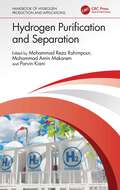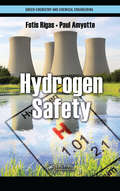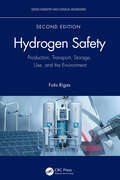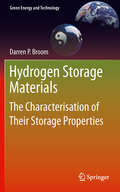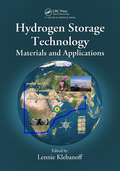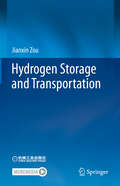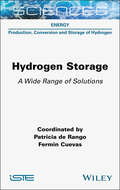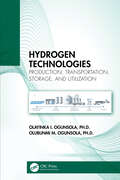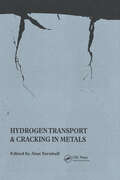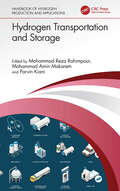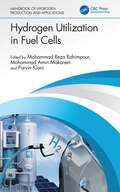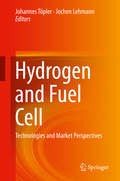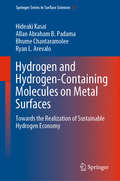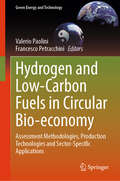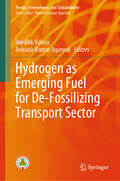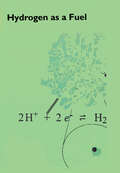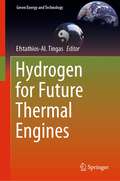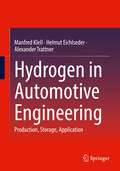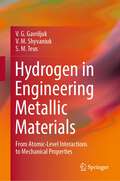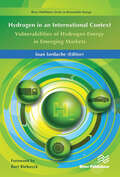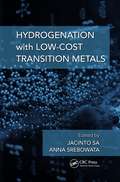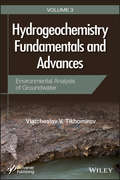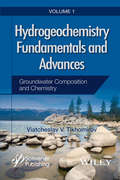- Table View
- List View
Hydrogen Purification and Separation
by Mohammad Reza Rahimpour Mohammad Amin Makarem Parvin KianiThe purification of hydrogen is necessary to fulfill purity standards of a wide variety of prospective uses, and it is also a key concern regarding the efficient supply of hydrogen. Hydrogen Purification and Separation reviews various hydrogen separation methods as well as membranes used in hydrogen separation. It discusses absorption and adsorption methods, as well as novel technologies such as cryogenic methods and plasma‑assisted technology, and the related economic assessments and environmental challenges. Introduces miscellaneous membrane‑assisted processes for hydrogen separation Provides different physiochemical absorption methods for hydrogen purification Discusses application of sorbents and swing technologies in hydrogen purification Uniquely covers hydrogen separation using novel methods Includes economic assessments and environmental challenges of hydrogen purification in detail Part of the multivolume Handbook of Hydrogen Production and Applications, this standalone book guides researchers and academics in chemical, environmental, energy, and related areas of engineering interested in development and implementation of hydrogen production technologies.
Hydrogen Safety (ISSN #13)
by Fotis Rigas Paul AmyotteHydrogen Safety highlights physiological, physical, and chemical hazards associated with hydrogen production, storage, distribution, and use systems. It also examines potential accident scenarios that could occur with hydrogen use under certain conditions. The number of potential applications for hydrogen continues to grow-from cooling power statio
Hydrogen Safety: Production, Transport, Storage, Use, and the Environment (ISSN)
by Fotis RigasWhile hydrogen is of vital and growing importance in many industrial sectors, this volatile substance poses unique challenges, including easy leakage, low ignition energy, a wide range of combustible fuel– air mixtures, buoyancy, and its ability to embrittle metals that are required to ensure safe operation. Updated to include the latest advances in the decade since original publication, Hydrogen Safety, Second Edition highlights physiological, physical, and chemical hazards associated with hydrogen production, storage, distribution, and usage systems. Focused on providing a balanced view of hydrogen safety – one that integrates principles from physical sciences, engineering, management, and social sciences – this book is organized to address questions associated with the hazards of hydrogen and the ensuing risks associated with its industrial and public use. This book: Addresses issues of inherently safer design, safety management systems, and safety culture. Features updated case studies of significant accidents involving hydrogen, along with their detailed analysis and lessons learnt, and potential accident scenarios under certain conditions. Details current research trends and perspectives on materials- based hydrogen storage solutions, hydrogen use in vehicles, and hydrogen in construction materials. Describes Process Safety Management as applied to the process industries, in conjunction with the components of the US Department of Energy Safety Plant Elements for hydrogen safety, and covers activities of the European Commission (EC) Network of Excellence for Hydrogen Safety (HySafe). Includes updated codes for gaseous and liquefied hydrogen and the NFPA 2 Hydrogen Technologies Code. Concludes with research and legal requirements. Offering a holistic view of hydrogen safety, from properties to safety systems, this book helps readers in chemical, industrial, safety, and related engineering subjects ensure a safe application and environment.
Hydrogen Storage Materials
by Darren P. BroomThe problem of storing hydrogen safely and effectively is one of the major technological barriers currently preventing the widespread adoption of hydrogen as an energy carrier and the subsequent transition to a so-called hydrogen economy. Practical issues with the storage of hydrogen in both gas and liquid form appear to make reversible solid state hydrogen storage the most promising potential solution. Hydrogen Storage Materials addresses the characterisation of the hydrogen storage properties of the materials that are currently being considered for this purpose. The background to the topic is introduced, along with the various types of materials that are currently under investigation, including nanostructured interstitial and complex hydrides, and porous materials, such as metal-organic frameworks and microporous organic polymers. The main features of Hydrogen Storage Materials include: an overview of the different types of hydrogen storage materials and the properties that are of interest for their practical use;descriptions of the gas sorption measurement methods used to determine these properties, and the complementary techniques that can be used to help corroborate hydrogen uptake data; andextensive coverage of the practical considerations for accurate hydrogen sorption measurement that drive both instrument design and the development of experimental methodology.Hydrogen Storage Materials provides an up-to-date overview of the topic for experienced researchers, while including enough introductory material to serve as a useful, practical introduction for newcomers to the field.
Hydrogen Storage Technology: Materials and Applications
by Lennie KlebanoffZero-carbon, hydrogen-based power technology offers the most promising long-term solution for a secure and sustainable energy infrastructure. With contributions from the world's leading technical experts in the field, Hydrogen Storage Technology: Materials and Applications presents a broad yet unified account of the various materials science, physi
Hydrogen Storage and Transportation
by Jianxin ZouThis book provides a comprehensive review of the latest hydrogen storage and transportation technologies. Starting with fundamental principles and research frontiers, the book introduces the state-of-the-art technologies in the storage and transportation using high-pressure compressed hydrogen, cryogenics and liquid hydrogen, hydrogen rich liquid compounds and solid-state hydrogen storage materials. Both qualitative and quantitative analyses are presented for each approach. The book also aims to provide hands-on tutorial for professionals and students to work in the fields of hydrogen energy and hydrogen related industries. This book is a valuable primer for professionals in the energy, materials science, chemistry and automotive industry. It is especially useful for those who are engaged in hydrogen production, storage, transportation and utilization. Covering low carbon technologies and carbon footprint as well, this book can also serve as a reference for teachers and students majoring in clean energy and functional materials in colleges and universities. The basis of English translation of this book, originally in Chinese, was facilitated by artificial intelligence. The content was later revised by the author for accuracy. Additional questions and answers via app: Download the Springer Nature Flashcards app free of charge and use exclusive additional material to test your knowledge.
Hydrogen Storage: A Wide Range of Solutions (ISTE Invoiced)
by Patricia de Rango Fermin CuevasHydrogen storage plays a central role in the hydrogen energy value chain. Efficient, economical and safe methods are essential to increase the gas' volume density and enable the sector's deployment. Hydrogen Storage analyzes the various ways of storing hydrogen, whether in a gaseous state in pressurized reservoirs or geological structures, in a liquid state through the formation of ammonia or hydrogen-carrying organic liquids, or in a solid state in hydrogen-containing inorganic compounds such as metal hydrides and regenerable hydrides, or by adsorption into porous materials. For each method, concepts are presented according to the processes used or the storage materials involved. Their advantages and disadvantages, as well as the main obstacles and challenges to be overcome, are analyzed. This book provides an overview of the various storage solutions currently available, helping operators to choose the most appropriate method for a given application.
Hydrogen Sulfide and Plant Acclimation to Abiotic Stresses (Plant in Challenging Environments #1)
by M. Nasir Khan Francisco J. Corpas Manzer H. Siddiqui Saud AlamriThis book focuses on the role of hydrogen sulfide in the protection of plants against abiotic stresses and abiotic stress-induced complications by the way of converging advanced key methods of proteomics, genomics, and metabolomics. It provides an update on the biosynthesis, signaling, and mechanism of action of hydrogen sulfide in combating abiotic stresses in plants. Also, special emphasis is given to the interaction of hydrogen sulfide with other signaling molecules (such as nitric oxide, carbon monoxide, hydrogen peroxide etc.), phytohormones, mineral nutrients, ions, and ion channels in plants. This work, uniquely, covers key aspects of hydrogen sulfide signaling in relation to abiotic stresses in plants, including programmed cell death, stomatal movement, and fruit ripening.
Hydrogen Technologies: Production, Transportation, Storage, and Utilization
by Olayinka I. Ogunsola Olubunmi M. OgunsolaOffering a wide-range coverage, this book provides fundamentals as well as the applied science and technology involved in the whole hydrogen value chain, including production, storage, transportation, and utilization. It discusses some challenges and opportunities for hydrogen to address energy demand and climate change issues.Features: Discusses various technology pathways for manufacturing/producing hydrogen both directly (i.e., water splitting) and indirectly (i.e., gas, conversion of coal, and biomass). Covers techniques and technologies for transporting gaseous, liquid, solid, and other forms of hydrogen, including mobile and stationary modes as well as small- and large-scale forms of transportation. Offers techniques and technologies for storing hydrogen with emphasis on materials and physical and chemical characteristics. Describes hydrogen utilization in energy/energy conversion, industrial chemical, industrial agricultural, and transportation sectors. This book is aimed at engineers and scientists working in the disciplines of energy, chemical, environmental, petroleum, petrochemical, and mechanical engineering.
Hydrogen Transport and Cracking in Metals: Proceedings of a Conference Held at the National Physical Laboratory, Teddington, UK, 13-14 April 1994
by Alan TurnbullProceedings of a Conference Held at the National Physical Laboratory, in Teddington, UK, on the 13-14 April 1994, with the main focus of Hydrogen Transport and Cracking in Metals.
Hydrogen Transportation and Storage
by Mohammad Reza Rahimpour Mohammad Amin Makarem Parvin KianiThe success of hydrogen energy markets depends on developing efficient hydrogen storage and transportation methods. Hydrogen may be stored in various ways, including compression, liquefaction, adsorption, hydrides, and reformed fuels. Hydrogen’s application, transport method, storage time, and other factors all have an impact on the technology choices available for its long‑term storage. This book comprehensively reviews hydrogen storage and transportation technologies along with related safety hazards and challenges. Introduces hydrogen storage and transportation materials and standards Includes miscellaneous hydrogen storage methods Covers different hydrogen transportation technologies Comprehensively describes hydrogen storage and transportation safety considerations Provides economic assessments and environmental challenges related to hydrogen storage and transportation Part of the multivolume Handbook of Hydrogen Production and Applications, this standalone book guides researchers and academics in chemical, environmental, energy, and related areas of engineering interested in development and implementation of hydrogen production technologies.
Hydrogen Utilization in Fuel Cells
by Mohammad Reza Rahimpour Mohammad Amin Makarem Parvin KianiHydrogen Utilization in Fuel Cells introduces the fundamentals, characteristics, and applications of fuel cells, materials used, the role of hydrogen in different fuel cell types, and applications of fuel cells in transportation and small portable and stationary power systems. Introduces the electrochemistry and thermodynamics of fuel cells Provides an overview of fuel cells materials Discusses applications of fuel cells in transportation and energy systems Describes the role of hydrogen in various fuel cells Details the kinetics, performance, stability, and environmental challenges of fuel cells Part of the multivolume Handbook of Hydrogen Production and Applications, this stand-alone book guides researchers and academics in chemical, environmental, energy, and related areas of engineering interested in development and implementation of hydrogen production technologies.
Hydrogen and Fuel Cell
by Johannes Töpler Jochen LehmannThis book introduces readers to hydrogen as an essential energy carrier for use with renewable sources of primary energy. It provides an overview of the state of the art, while also highlighting the developmental and market potential of hydrogen in the context of energy technologies; mobile, stationary and portable applications; uninterruptible power supplies and in the chemical industry. Written by experienced practitioners, the book addresses the needs of engineers, chemists and business managers, as well as graduate students and researchers.
Hydrogen and Hydrogen-Containing Molecules on Metal Surfaces: Towards the Realization of Sustainable Hydrogen Economy (Springer Series in Surface Sciences #71)
by Hideaki Kasai Allan Abraham Padama Bhume Chantaramolee Ryan L. ArevaloThis book is dedicated to recent advancements in theoretical and computational studies on the interactions of hydrogen and hydrogenated molecules with metal surfaces. These studies are driven by the development of high-performance computers, new experimental findings, and the extensive work of technological applications towards the realization of a sustainable hydrogen economy. Understanding of the elementary processes of physical and chemical reactions on the atomic scale is important in the discovery of new materials with high chemical reactivity and catalytic activity, as well as high stability and durability. From this point of view, the book focuses on the behavior of hydrogen and hydrogenated molecules on flat, stepped, and reconstructed metal surfaces. It also tackles the quantum mechanical properties of hydrogen and related adsorbates; namely, molecular orbital angular momentum (spin) and diffusion along the minimum potential energy landscape on metal surfaces. All of these profoundly influence the outcomes of (1) catalytic reactions that involve hydrogen; (2) hydrogen storage in metals; and (3) hydrogen purification membranes. Lastly, it surveys the current status of the technology, outlook, and challenges for the long-desired sustainable hydrogen economy in relation to the topics covered in the book.
Hydrogen and Low-Carbon Fuels in Circular Bio-economy: Assessment Methodologies, Production Technologies and Sector-Specific Applications (Green Energy and Technology)
by Valerio Paolini Francesco PetracchiniThis book explains how decarbonisation of transport connects to the wider project of making more sustainable and circular society. Emissions reduction in the transportation sector has become a critical challenge for both mitigating climate change and reducing diseases due to air pollution. However, transport decarbonization is also strongly connected to the urgent need of an increased resource efficiency and a transition towards a more sustainable, bio-based and circular society. This book describing the technology and the potential application of hydrogen and low carbon fuels. In the first section, it lays out the general principles and assessment methodologies, including the evaluation of local and global impacts from an environmental, economic and social perspective. Subsequently, the second section describes the technology to produce sustainable fuels including electrolytic hydrogen and electro-methane, bio-hydrogen, gaseous and liquid biofuels. Finally, in the book&’s last section, specific case studies are provided including urban and long-range wheel transport, as well as rail, navigation and airplane applications.
Hydrogen as Emerging Fuel for De-Fossilizing Transport Sector (Energy, Environment, and Sustainability)
by Avinash Kumar Agarwal Hardikk ValeraThis book aims to explore the role of hydrogen as a promising alternative to fossil fuels, particularly in the transport and heavy-duty sectors. As global efforts to reduce greenhouse gas (GHG) emissions accelerate, policymakers are increasingly focusing on hydrogen to achieve net-zero targets. While battery electric vehicles (BEVs) are expected to dominate the market for two-wheelers (2Ws), three-wheelers (3Ws), and personal cars, hydrogen-fueled internal combustion engines (ICEs) are emerging as a key solution for buses, heavy-duty trucks, construction machinery, agricultural equipment, and non-road applications. This book presents an in-depth analysis of hydrogen-fueled engine technology, discussing its advantages, challenges, and future potential. It highlights how hydrogen-fueled engines eliminate emissions of particulate matter, carbon monoxide (CO), carbon dioxide (CO₂), and volatile organic compounds (VOCs). However, nitrogen oxides (NOₓ) emissions remain a challenge, which can be mitigated through advanced after-treatment systems and optimized engine operating conditions. This book focuses on various hydrogen production technologies, recent advancements in hydrogen-fueled internal combustion engines, and novel fuel injection strategies for achieving efficient and knock-free hydrogen combustion. It covers a wide range of topics, including port fuel hydrogen injection, diesel pilot ignition, hydrogen production from alternative sources, and the challenges of hydrogen storage and distribution. Additionally, it examines the role of hydrogen in maritime applications and its potential as a future fuel for internal combustion engines. Through a comprehensive discussion of cutting-edge research and technological innovations, this book provides valuable insights for researchers, engineers, policymakers, and industry professionals working toward a sustainable hydrogen-powered future.
Hydrogen as a Fuel: Learning from Nature
by Robert Robson Richard Cammack Michel FreyThere continues to be widespread interest in the applications of hydrogen as a clean fuel and its potential for local electricity production and use in transport. Recent years have seen a variety of breakthroughs in our understanding of the nature, structure, and biosynthesis of hydrogenases. This book is a timely description of these developments,
Hydrogen for Clean Energy Production: Combustion Fundamentals and Applications
by Medhat A. Nemitallah Mohamed A. Habib Ahmed AbdelhafezThe book fills the existing gap in the literature on clean and hydrogen combustion technologies for industrial applications. This gas is created due to the absence of a comprehensive textbook that covers such kinds of developments. This book can be used as a textbook for graduate-level courses in the areas of clean and hydrogen combustion and as a reference book for short courses to be offered to mechanical and aerospace engineers and young researchers worldwide. The book chapters consider investigating clean and hydrogen combustion techniques for different applications based on experimental measurements along with detailed numerical simulations. Detailed descriptions of the different numerical models are presented for given applications to solve for the flow/flame fields, which are very important, especially for beginners and undergraduate students in the fields of clean and hydrogen combustion.
Hydrogen for Future Thermal Engines (Green Energy and Technology)
by Efstathios-Al. TingasThis book explores the potential of hydrogen combustion in thermal engines and serves as a foundation for future research.Hydrogen, a well-established energy carrier, has been used in internal combustion engines for centuries, but despite progress and industry interest, hydrogen engines have yet to reach mass production. In light of recent efforts to combat climate change with clean energy and environmentally-friendly technologies, the use of hydrogen in thermal engines is gaining momentum.This book examines the unique challenges of hydrogen combustion due to its wide flammability limits, high auto-ignition temperature, and high diffusivity. It reviews current knowledge on the fundamental and practical aspects of hydrogen combustion and considers current developments and potential future advancement.
Hydrogen in Automotive Engineering: Production, Storage, Application
by Manfred Klell Helmut Eichlseder Alexander Trattner„Wasserstoff in der Fahrzeugtechnik“ bietet einen allgemeinen Überblick über die verschiedenen Aspekte von Eigenschaften, Erzeugung, Speicherung und Anwendung von Wasserstoff. Schwerpunkte liegen auf der Thermodynamik der Speicherung von Wasserstoff sowie auf der Anwendung in der Fahrzeugtechnik und in der Energietechnik. Mit Bezug zu Forschungsvorhaben an der TU Graz und dem HyCentA wird der aktuelle Stand der Technik fundiert dargestellt. Als eigener Abschnitt wurde in dieser Auflage die Brennstoffzelle zur Stromerzeugung für Elektroantriebe ergänzt. Ein Verfahren zur Wasserstoffproduktion durch Pyrolyse aus Glycerin wurde neu aufgenommen. Ergänzt wurden Abschnitte über aktuelle Anwendungen, über Verbrennungsmotoren für Gemische aus Wasserstoff und Methan, über Werkstoffe sowie Fragen von Wirkungsgrad und CO2-Emissionen.
Hydrogen in Engineering Metallic Materials: From Atomic-Level Interactions to Mechanical Properties
by V. G. Gavriljuk V. M. Shyvaniuk S. M. TeusThis book analyzes the effect of hydrogen on the atomic-level interactions in metals, detailing the corresponding changes in the physical properties of crystal lattice defects, diffusion, and phase transformations in metallic materials as a result of hydrogen loading. It presents a novel derivation of the structure of stacking faults, the mobility of dislocations, and short-range atomic order in hydrogen-infused metallic alloys based on the change in the concentration of free electrons. It reviews the current hypotheses behind hydrogen embrittlement of iron-, nickel, and titanium-based alloys, focusing on the phenomenon of hydrogen-enhanced localized plasticity and taking into account inherent atomic states in the alloys and other effects due to hydrogen loading. Finally, the book analyzes the use of hydrogen as an interim alloying element in the technological processing of titanium alloys, discussing the necessary preconditions for hydrogen-enhanced plasticity of metals. This book is an excellent resource for graduate students, academic researchers, and practicing engineers involved in the development of advanced hydrogen-resistant metallic materials.
Hydrogen in an International Context: Vulnerabilities of Hydrogen Energy in Emerging Markets
by Ioan IordacheHydrogen in an International Context: Vulnerabilities of Hydrogen Energy in Emerging Markets describes strategies and developments for hydrogen civilization efforts realised by various stakeholders such as authorities, institutes, research, industry, and individuals, in different countries and at different stages of the development cycle. Through their contributions, the chapter authors in this book propose a new approach to actual and relevant topics of interest, generically called the hydrogen economy and civilization.Hydrogen vulnerabilities is a topic that includes new challenges that face the hydrogen energy market. Weaknesses for the hydrogen stakeholder are becoming more refined, and it is necessary to be an active and sensitive player to understand these. A prosperous development of hydrogen will require the assimilation of numerous, diverse and unfamiliar contexts. Challenges for hydrogen will not only be in scientific, technical, economical or public acceptance, but challenges also lie in the genesis of this topic and the neglect of some aspects, however marginal, which negatively influence the desired hydrogen developed.This book informs the reader about the status of hydrogen energy in the international market, and it includes a series of examples and case studies about hydrogen activities in various countries. Thus, due to the synergy of this library of contexts, the reader should be able to reach a level of intuition enabling them to see the strengths and weaknesses of hydrogen.
Hydrogenation with Low-Cost Transition Metals
by Jacinto Sa Anna SrebowataHydrogenation with Low-Cost Transition Metals describes recent developments in the preparation of catalysts and their catalytic abilities in chemoselective hydrogenation for the production of fine chemicals and pharmaceutical compounds. Emphasizing the use of low-cost metals (Cu, Ni, Fe, and Ag) that are often present in the form of nanoparticles, the book provides valuable reaction mechanism schemes, engineering solutions, and perspective for the field.
Hydrogeochemistry Fundamentals and Advances, Environmental Analysis of Groundwater: Environmental Analysis Of Groundwater
by Viatcheslav V. TikhomirovWater is the Earth’s most precious resource. Until recent years, water was often overlooked as being overly abundant or available, but much has changed all over the world. As climate change, human encroachment on environmental areas, and deforestation become greater dangers, the study of groundwater has become more important than ever and is growing as one of the most important areas of science for the future of life on Earth. This three-volume set is the most comprehensive and up-to-date treatment of hydrogeochemistry that is available. The first volume lays the foundation of the composition, chemistry, and testing of groundwater, while volume two covers practical applications such as mass transfer and transport. Volume three, which completes the set, is an advanced study of the environmental analysis of groundwater and its implications for the future. This third volume focuses more deeply on the analysis of groundwater and the practical applications of these analyses, which are valuable to engineers and scientists in environmental science, groundwater remediation, petroleum engineering, geology, and hydrology. Whether as a textbook or a reference work, this volume is a must-have for any library on hydrogeochemistry.
Hydrogeochemistry Fundamentals and Advances: Groundwater Composition and Chemistry
by Viatcheslav V. TikhomirovWater is the Earth’s most precious resource. Until recent years, water was often overlooked as being overly abundant or available, but much has changed all over the world. As climate change, human encroachment on environmental areas, and deforestation become greater dangers, the study of groundwater has become more important than ever and is growing as one of the most important areas of science for the future of life on Earth. This three-volume set is the most comprehensive and up-to-date treatment of hydrogeochemistry that is available. The first volume lays the foundation of the composition, chemistry, and testing of groundwater, while volume two covers practical applications such as mass transfer and transport. Volume three, which completes the set, is an advanced study of the environmental analysis of groundwater and its implications for the future. This first volume in the set is an important milestone in hydrogeochemistry, covering the fundamentals of groundwater science. It also goes further into testing methods, applications of testing, and analysis. It is not only the introductory text for this groundbreaking and ambitious new three-volume project, but it is also a valuable reference for the scientist, engineer, or student. Whether as a textbook or a reference work, this volume is a must-have for any library on hydrogeochemistry.
